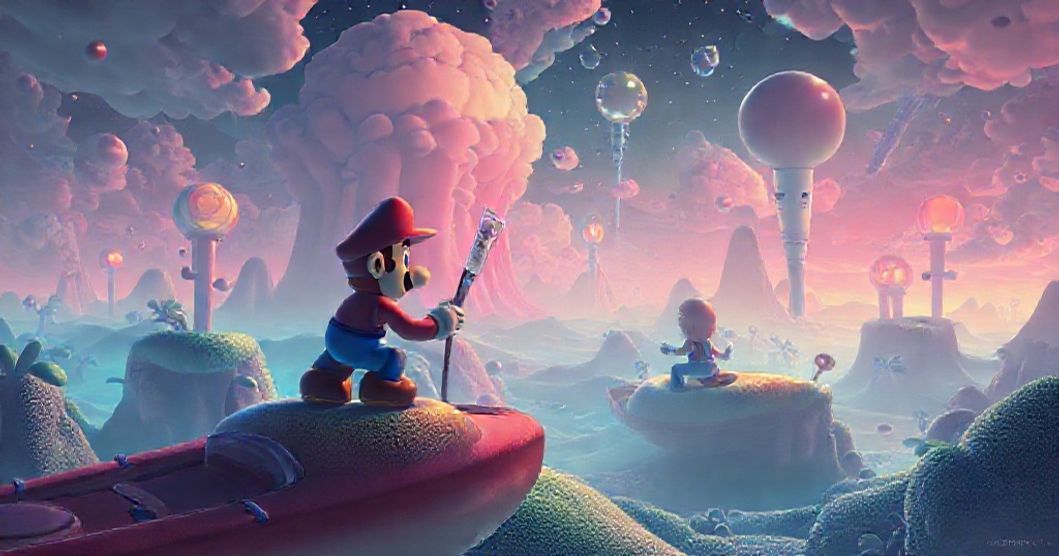Part 1: Dream Presentation
Dreams often bridge the familiar and the fantastical, creating landscapes that feel simultaneously real and alien. In this particular dream, the nostalgic world of Mario Party—with its board games, competitive energy, and childhood nostalgia—collides with an absurd, gendered twist that lingers in the mind long after waking. Here is the complete dream narrative as the dreamer experienced it:
I found myself in a vivid Mario Party game with my closest friends, the familiar board game sounds filling my ears as we raced through colorful landscapes and competed for the top spot. The atmosphere felt both nostalgic and surreal—like revisiting childhood summers while simultaneously experiencing something deeply unfamiliar. As the game progressed, the tension mounted with each dice roll, and I soon realized I’d fallen into last place. In that moment, my controller buzzed to life, emitting a faint electrical hum that sent shivers down my spine. Without warning, a cold, almost imperceptible prickle pierced my thumb, and a disorienting voice in my mind declared, 'Estrogen administration complete.' My friends, completely unfazed by this bizarre turn of events, continued their game as if nothing had happened, their laughter echoing around me as I stared at my trembling hands in confusion. I woke up with a knot of anxiety in my chest, haunted by the dream’s illogical yet strangely meaningful elements. The surreal injection and the casual acceptance by my friends left me desperate to understand what this dream could possibly signify.
Part 2: Clinical Analysis
Want a More Personalized Interpretation?
Get your own AI-powered dream analysis tailored specifically to your dream
🔮Try Dream Analysis FreeSymbolic Landscape: Unpacking the Dream’s Elements
The dream’s power lies in its juxtaposition of the mundane and the absurd, creating a psychological mirror for the dreamer’s inner conflicts. Mario Party, a game emblematic of friendly competition and group dynamics, serves as a microcosm of social life itself—the board games, dice rolls, and rankings reflecting the constant comparison inherent in human interaction. The 'last place' scenario literalizes the fear of inadequacy and the pressure to maintain status in social settings, a universal experience that many recognize in both online and offline friendships.
The estrogen injection, however, introduces a layer of gendered symbolism that transcends the game itself. Estrogen, a hormone deeply tied to femininity and gender identity, becomes a vehicle for transformation in this surreal context. The controller as delivery mechanism suggests an external force imposing change—perhaps societal expectations, internalized gender norms, or unexpected shifts in identity. The injection’s specificity (a medical procedure within a playful context) heightens the dream’s surreal quality, making it both unsettling and deeply personal.
Psychological Undercurrents: Theoretical Perspectives
From a Jungian perspective, Mario Party represents the dreamer’s 'shadow self'—the aspects of identity we fear or reject in ourselves. The game’s competitive nature mirrors the collective unconscious’ struggle to maintain control over one’s perceived worth. The injection could symbolize the integration of traditionally 'feminine' qualities into the dreamer’s masculine identity, or vice versa, as Jungian theory suggests dreams often address psychological wholeness by confronting repressed aspects.
Freudian analysis might interpret the dream as a manifestation of repressed desires or anxieties around gender roles. The controller as a phallic symbol delivering a hormone could represent the dreamer’s unconscious negotiation of power dynamics in relationships, where the fear of 'losing' (last place) translates into a fear of losing control over one’s identity. The friends’ indifference to the injection highlights how others’ perceptions of gender roles might feel external and unyielding to the dreamer’s internal experience.
Neuroscientifically, the dream reflects the brain’s default mode network at work—processing recent waking experiences of competition, social comparison, and perhaps subtle gender identity questions. The absurdity of the scenario suggests the brain is synthesizing conflicting emotions into a cohesive narrative, using the familiar (Mario Party) to frame unfamiliar (gendered transformation) themes.
Emotional and Life Context: Triggering Factors
The dream likely arises from the tension between social expectations and personal identity. Mario Party’s nostalgic setting suggests the dreamer values their friendships deeply, yet the competitive pressure within them creates anxiety about maintaining status. The estrogen injection could symbolize a fear of 'failing' in social contexts by not conforming to traditional gender roles, or conversely, the unexpected embrace of aspects of oneself previously ignored.
The dreamer’s confusion upon waking indicates an emotional dissonance between the playful game environment and the serious implications of the injection. This suggests a real-world situation where the dreamer feels pressured to conform to certain social norms while simultaneously questioning their authenticity. The friends’ lack of reaction to the surreal event might reflect the dreamer’s perception that others accept these norms without self-reflection, creating a sense of isolation in their own identity exploration.
Therapeutic Insights: What the Dreamer Can Learn
This dream invites the dreamer to explore their relationship with competition and self-worth. Journaling about recent social interactions where they felt 'last place'—whether in work, friendships, or creative pursuits—could reveal patterns of comparison that trigger anxiety. The injection, while surreal, offers an opportunity to ask: 'What would it mean to embrace unexpected aspects of myself without fear?'
Practicing self-compassion exercises, such as listing personal strengths unrelated to competition, can counteract the 'last place' narrative. The dream also suggests the importance of integrating traditionally 'feminine' or 'masculine' traits without judgment, recognizing that true strength comes from self-acceptance rather than external validation.
FAQ Section
Q: Why would a dream inject estrogen specifically?
A: Estrogen symbolizes gender identity and societal expectations. The injection represents an unexpected transformation or shift in how the dreamer views themselves in competitive contexts.
Q: How does the familiar Mario Party setting affect interpretation?
A: The nostalgic game grounds the dream in real social experiences, making the surreal element more jarring. It suggests the dreamer processes real-world competition through a lens of identity exploration.
Q: Why did the friends seem unaffected?
A: This likely reflects the dreamer’s perception of others’ comfort with social norms versus their own internal discomfort. Others’ indifference may symbolize external pressures feeling unyielding to the dreamer’s personal journey.
